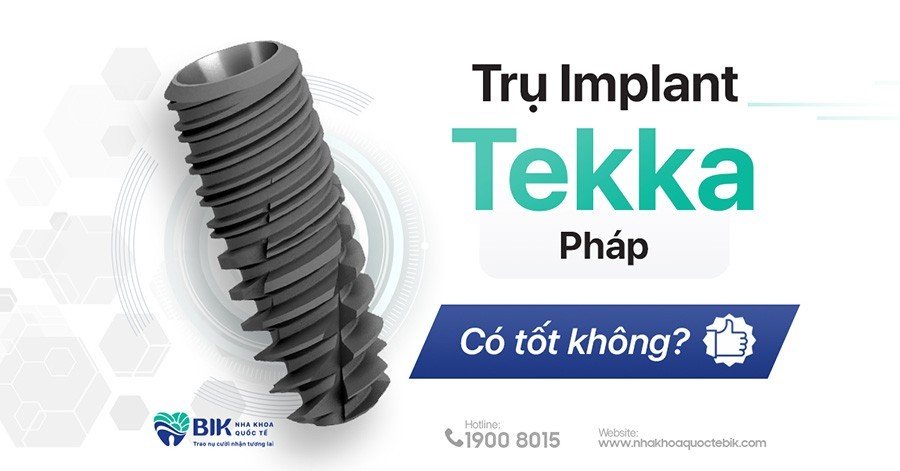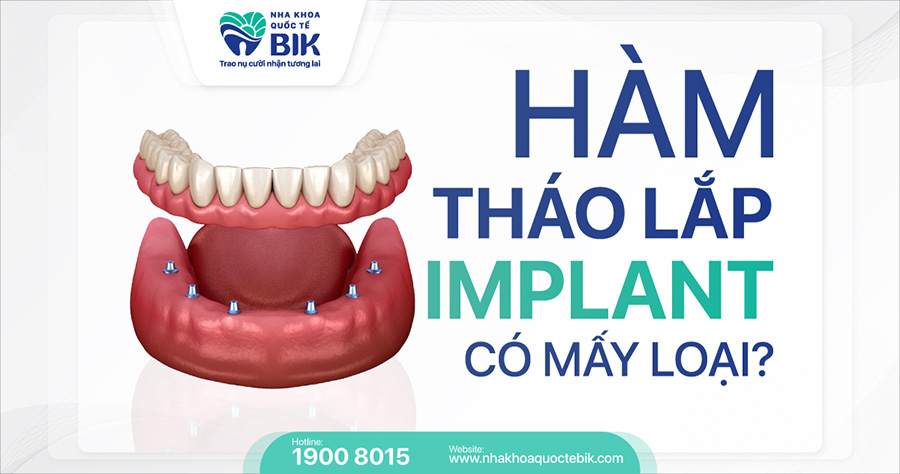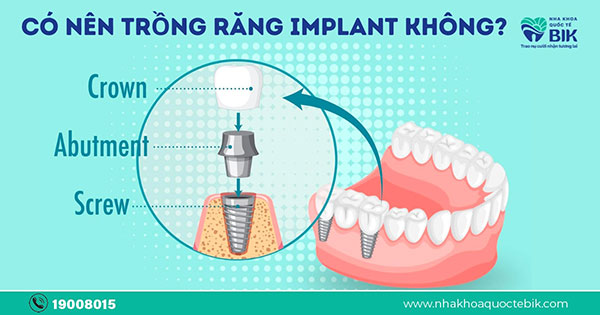Dental implants are considered a safe and effective long-term restoration method for missing teeth. However, many people still hesitate when deciding to perform this method because they have not yet had an answer to the question of whether dental implants are painful. Although the dental implant process can cause you pain and discomfort, the results of dental implants will overcome many problems caused by missing teeth later.
1. Implantation process

The implantation process usually includes the following steps:
1.1. General examination
The doctor will perform a general examination to detect diseases such as tooth decay or periodontitis (if any). You will need to completely treat oral diseases before starting the implant to achieve the highest efficiency.
1.2. CT scan and consultation
The doctor will take a CT scan to know the condition of the teeth and bones at the location where the implant is needed. From there, a detailed treatment plan will be made for each oral condition.
1.3. Implantation
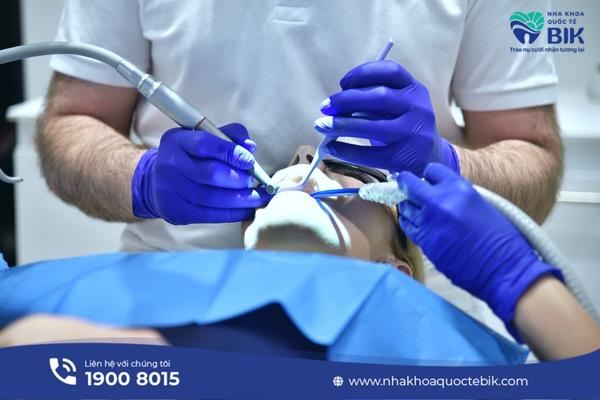
The doctor will perform anesthesia before performing the surgery to insert the implant into the jawbone. The process only lasts about 30-60 minutes and is performed in a strictly sterile environment.
1.4. Attaching the Abutment and taking impressions for porcelain teeth
After the Implant pillar has completely integrated with the jawbone in the most stable way, the doctor will attach the Abutment joint to the pillar and take the impression of the teeth to start making porcelain teeth.
1.5. Attaching porcelain teeth
After the Implant pillar has integrated stably with the jawbone, the doctor will proceed to attach the porcelain teeth to the pillar, completing the Implant tooth implantation process.
2. Is the Implant tooth implantation method painful?
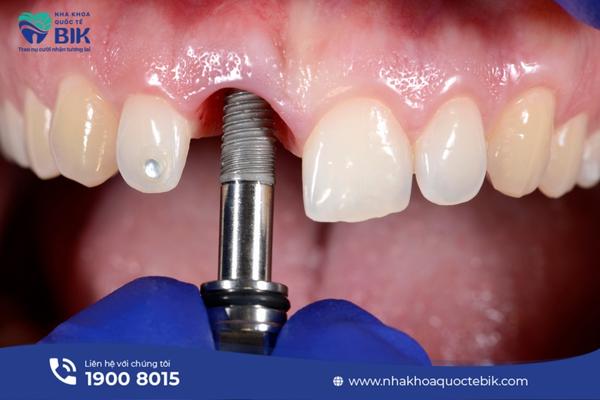
Does dental implant hurt? Let’s find out with BIK international dentistry!
2.1. During surgery
During dental implant surgery, the doctor will perform operations such as drilling and screwing to insert the implant deep into the jawbone. Hearing this, everyone will surely feel pain, but in fact, implanting an implant is easier than removing a tooth.
Usually, local anesthesia will be used during the implant procedure to help the patient stay awake without feeling pain. In particular, if the surgery is performed on a healthy jawbone, there will be absolutely no pain.
In addition, long-term tooth loss can cause the nerves around the tooth root to disappear, so you will no longer feel the pain as clearly as when extracting teeth.
2.2. After surgery
After implant surgery, the anesthetic will gradually wear off, so the patient will feel pain and discomfort in the chin, cheeks or under the eyes. The skin and gums may also be bruised and there may be slight bleeding at the implant site. However, the level of pain depends on each person’s endurance and constitution. The pain will gradually decrease within 1 to 2 days if you follow the doctor’s instructions.
3. Factors affecting the level of pain after implant surgery
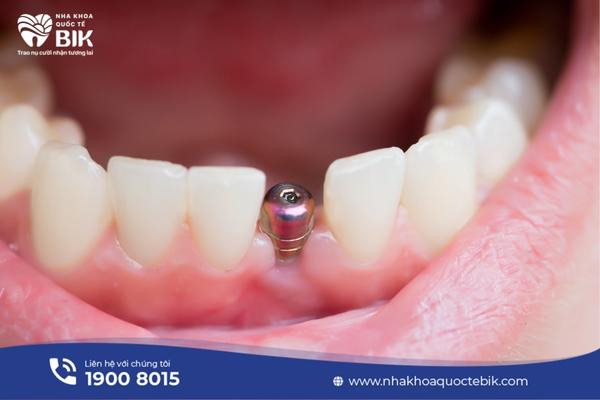
The level of pain after implant placement will depend on the following factors:
3.1. Implantation location
If the implant needs to be placed close to the jaw and intermaxillary nerves, the pain will be felt more clearly than in other locations.
3.2. Number of teeth to be implanted
If multiple implants are performed at the same time, even the entire jaw, the pain will be many times greater and is inevitable. In this case, the doctor will give instructions to minimize the pain safely and effectively.
3.3. Doctor’s skills
The doctor’s expertise is the most important factor determining the safety and effectiveness of the implant surgery. A highly skilled and experienced prosthetist will minimize the patient’s pain with professional and precise operations during the dental restoration process.
3.4. Modern technology machines
Implantation is a relatively complicated technique, so it requires the support of a lot of equipment and machinery. Highly skilled doctors with the support of modern machinery will make patients feel more secure and confident when performing dental implants
4. How long will the discomfort last after implant surgery?
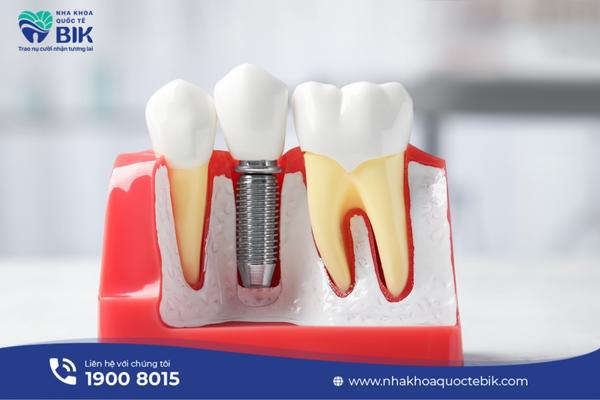
Usually, patients will feel discomfort and pain in the implant area, face and jaw for about 10 days after implantation. This is normal and starting from the 3rd day onwards, the pain will be significantly reduced.
Within 14 days, the pain will stop and the wound at the implant site will have completely healed. If the patient still feels pain on the 14th day, they should see a doctor immediately because the wound may be infected.
5. How to relieve pain after implant surgery
Pain will appear when the anesthetic wears off, it is important to take the following measures to minimize discomfort:
5.1. Use pain relievers
Some pain relievers and anti-inflammatory drugs will be prescribed by your doctor to help you feel more comfortable in the first days after implant surgery. It is important to use the medication in the correct dosage and time as prescribed, and do not use external pain relievers to avoid unwanted side effects.
5.2. Apply ice
Applying ice is a quick and effective way to relieve pain. Using an ice pack or a clean towel wrapped in ice to apply to the painful cheek will help you feel more comfortable. You should change the ice every 20 minutes for best results.
5.3. Reasonable diet

Your daily diet will also help reduce pain:
5.3.1. Eat soft, liquid foods
Soft, liquid foods such as porridge and soup will make it easier for you to chew after having your teeth implanted because the implant has not yet integrated with the jawbone. In addition, you should avoid using hard, chewy foods that require biting force. If you insist on using them, you will experience severe pain and may cause the implant to be displaced.
5.3.2. Nutritional supplements
It takes 3-6 months for the jawbone to return to normal health, so you should supplement enough nutrients to promote jawbone development as well as ensure the health of the body.
5.3.3. Drink enough water
Provide enough water to keep the body healthy and normal, while reducing pain and eliminating bacteria in the oral cavity.
5.3.4. Do not smoke

Cigarettes contain many substances that reduce oxygen in the blood, thereby reducing the growth of tissues around the implant. If you continue to use tobacco, the implant is likely to be rejected and not integrated with the jawbone.
5.4. Oral hygiene
To avoid infection, you need to clean your teeth with a soft-bristled toothbrush combined with dental floss to remove food debris between your teeth. Within 1 week after implant placement, you should not rinse your mouth with saline solution but instead use a specialized mouthwash.
Hopefully the information provided above has helped you find the answer to the question of whether dental implants are painful. In general, the feeling of pain and discomfort after dental implants is inevitable. However, there are many measures that have been proposed to reduce pain at home safely, effectively and without affecting the quality of dental implants.






